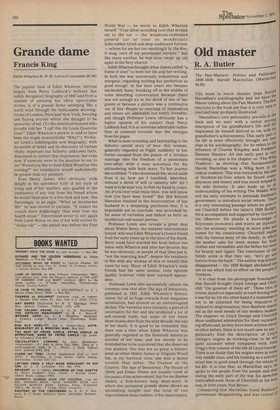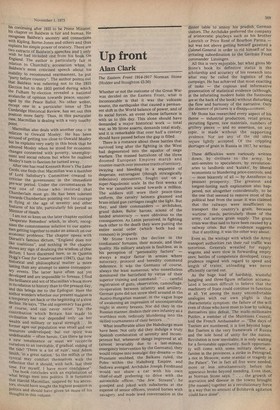Old master
R. A. Butler £T1 49h .oe 560)P1 9a 3s 9t s a Mats or sl d: Politicsm a cmillaannd (M This book is much shorter than Harold Macmillan's autobiography and we have the, Master talking about the Past Masters. The firs' reactions to the book are that it is very easY read and most profusely illustrated. Macmillan's own personality prevails in the book and we start with a rather movirlg_
description of his grandfather's life and the
inspiration .he himself derived to vie with hisf grandfather's achievements. This early Part ° his life is more effectively brought out here than in his autobiography, for he refers to the influence of Charles Kingsley and Fredericl{ Denison Maurice. All this early part is vela' revealing, as also is his chapter on 'The Whig Tradition', as showing that fundamentallY Harold Macmillan was a Whig born in the radical tradition. This was nurtured by his Ore at Stockton-on-Tees where he found unerilployment and misery and was much helped bY his wife Dorothy. It also leads up to a° understanding of his writing The Middle WaY and his early attempts to persuade BaldWia's government to introduce social reform. There is a very interesting passage where he goes r0 see Churchill before the latter's 1929 Budget, He is accompanied and supported by Garvin the Observer. He pleads a knowledge Keynesian economics and wants an injectI0r1A into the economy resulting in more jobs an" homes for his constituents. Churchill replies with his famous story of the family, in vvilleh the mother asks for more money for food, clothes and necessities and the father for ril°1:e for brandy and cigars. The conclusion of th',15 family scene is that they say, "let's go borrow from the bank". The author was bitteflY disappointed — the 1929 Budget abolished thef tax on tea which had no effect on the people Stockton. It is clear from the photograph frontispiece that Harold thought Lloyd George and Mut; chill "the greatest of them all". These two, 0` course, stand out especially as each having NO.° a war for us. On the other hand if a statesman if not to be criticised for being impulsive °I. inclined to tergiversation, then Baldwin stands out as the most steady of our modern leaders' The chapters on Lloyd George and Churchill show undiluted admiration for their outstand' ing efforts and, as they have been written aboat so often before, there is not much new to saY. I personally find the description of Lloyd George's origins as working-class to be ncEt quite accurate when compared with Jall° Grigg's first volume of the life of Lloyd George' There is no doubt that his origins were in sonle way middle class, and his training as a solicitor stood him in good stead through the whole of his life. It is true that, as Macmillan says, he spoke to the people from the people and that during the early part of the war his speeches outrivalled even those of Churchill at his best and, in later years, Nye Bevan. Considering that Macmillan found Baldwin's, government disappointing and was critical °' his continuing after 1935 to be Prime Minister, his chapter on Baldwin is fair and human. He recognises Baldwin's ancestry and connections With Kipling, Burne-Jones and others and thus explains his simple power of oratory. There are two extracts of Baldwin's speeches and I only wish he had included one from his book On England. The author is particularly fair in relation to Churchill's accusation when, in Baldwin's most criticised speech about his inability to recommend rearmament, he put party before country". The author points out that Baldwin was referring not to the 1935 Election but to the 1933 period during which the Fulham by-election revealed a national avalanche of opinion towards peace, encouraged by the Peace Ballot. No other writer, except one in a particular issue of The Cambridge Historical Review, has set out this position more fairly. Thus, in this particular ease, Macmillan is dealing with a very touchy
Point.
Macmillan also deals with another one — in relation to Oswald Mosley. He has been accused of getting too close to Oswald Mosley but he explains very early in this book that he admired Mosley when he stood for economic changes connected with poverty, unemployment and social reform but when he realised Mosley's turn to fascism he turned away.
After one has read Kenneth Rose's The Later Cecils, one finds that Macmillan was a member of Lord Salisbury's Committee created to criticise the government in the immediate pre-war period. Under the circumstances he was one of those who insisted that Chamberlain must go. He has been tolerant towards Chamberlain pointing out his courage in flying at the age of seventy and other features of his life, particularly his period as Minister of Heath.
I am not so keen on the later chapter entitled 'Desperate Remedies' which, in short, recognises the commonsense solution to our statesmen getting together to make an assault on our economic problems. The chapter opens with Disraeli's famous dictum, "England does not like coalitions", and nothing in the chapter Shows any sign of doubting the wisdom of that dictum: I have discerned here, as in Quintin Hogg's Case for Conservatism (1947), that the historical and philosophical matter is more lasting than any attempt to assess contemporary events. The latter have often not yet developed and are impossible to foresee. I find the brilliance and wit of Macmillan's book more in its relation to history than to the present day, and this brings me to the Epilogue. Here the author wonders whether our present malaise is a temporary set-back or the beginning of a slow decline. He says, "The old supremacy has gone, Of course, and can never recur. Yet the contribution which Britain has made to civilisation has not depended only on her wealth and military or naval strength In former ages our population was small and our resources undeveloped; but our spirit was undefeatable — often heroic. Can there be now a new renaissance or must we reconcile ourselves to an inevitable, if gradual, ebbing of the tide? 'There is a lot of ruin', said Adam Smith, in a great nation.' So the selfish or the cynical may comfort themselves with the reflection that it should, with luck, last their time. For myself, I have more confidence". The book concludes with an explanation of What brings men into politics. It is fortunate that Harold Macmillan, inspired by his ancestors, should have sought the highest position in politics and should have given us more of his thoughts in this volume.

































 Previous page
Previous page